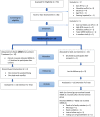Occupational Therapist-Led Mindfulness Training Program for Older Adults Living with Early Cognitive Decline in Primary Care: A Pilot Randomized Controlled Trial
- PMID: 37662611
- PMCID: PMC10473152
- DOI: 10.3233/ADR-230006
Occupational Therapist-Led Mindfulness Training Program for Older Adults Living with Early Cognitive Decline in Primary Care: A Pilot Randomized Controlled Trial
Abstract
Background: Community-dwelling older adults with early cognitive deficits experience less efficiency in performing everyday life tasks, resulting in decreased satisfaction and other adverse psychological outcomes. Mindfulness training has been linked to cognitive and psychological improvements and, most recently, has been identified as a potential intervention supporting performance of everyday life activities.
Objective: This study aimed to evaluate whether mindfulness practice can improve perceived performance and satisfaction with everyday life activity and secondary psychological outcomes.
Methods: This study is a pilot randomized controlled trial (RCT) in an interprofessional primary care team practice in Toronto, Ontario, Canada. The participants were 27 older adults aged 60 years of age or older living with early cognitive deficits. Participants were randomized into an 8-Week mindfulness training program (n = 14) group or a Wait-List Control (WLC; n = 13) group compared at baseline, post-intervention and 4-weeks follow-up. MANOVAs with post-hoc independent t-tests were used to compare between groups at different time points.
Results: There was a significant improvement in anxiety for the intervention group compared to the WLC group at post-intervention; Time-2 (mean difference = 3.90; CI = 0.04-7.75; p = 0.04) with large effect size (d = 0.80).
Conclusion: Mindfulness training significantly improved anxiety scores for patients with early cognitive deficits post-intervention. Further work is required to test the sustainability of reduced anxiety over time, but this study demonstrated that MBSR is a promising primary care intervention for those living with early cognitive deficits. This study warrants the pursuit of a future study in exploring how long the reduced anxiety effects would be sustained.
Keywords: Activities of daily living; Alzheimer’s disease; anxiety; health promotion; mild cognitive impairment; mindfulness meditation; occupational therapy; older adults; primary care; psychological outcomes; subjective cognitive decline.
© 2023 – The authors. Published by IOS Press.
Conflict of interest statement
The authors have no conflict of interest to report.
Similar articles
-
Mindfulness-based stress reduction for community-dwelling older adults with subjective cognitive decline (SCD) and mild cognitive impairment (MCI) in primary care: a mixed-methods feasibility randomized control trial.BMC Prim Care. 2023 Feb 9;24(1):44. doi: 10.1186/s12875-023-02002-y. BMC Prim Care. 2023. PMID: 36759766 Free PMC article. Clinical Trial.
-
Occupational therapist-led mindfulness-based stress reduction for older adults living with subjective cognitive decline or mild cognitive impairment in primary care: a feasibility randomised control trial protocol.BMJ Open. 2020 Jun 23;10(6):e035299. doi: 10.1136/bmjopen-2019-035299. BMJ Open. 2020. PMID: 32580984 Free PMC article.
-
Effects of Mindfulness Training and Exercise on Cognitive Function in Older Adults: A Randomized Clinical Trial.JAMA. 2022 Dec 13;328(22):2218-2229. doi: 10.1001/jama.2022.21680. JAMA. 2022. PMID: 36511926 Free PMC article. Clinical Trial.
-
The Effects of Mindfulness on Older Adults with Mild Cognitive Impairment.J Alzheimers Dis Rep. 2017 Dec 2;1(1):181-193. doi: 10.3233/ADR-170031. J Alzheimers Dis Rep. 2017. PMID: 30480237 Free PMC article.
-
Mindfulness and bodily distress.Dan Med J. 2012 Nov;59(11):B4547. Dan Med J. 2012. PMID: 23171754 Review.
References
-
- Petersen RC (2011) Mild cognitive impairment. N Engl J Med 364, 2227–2234. - PubMed
-
- Silva LDSVE, Silva TBLE, Falcão DVDS, Batistoni SST, Lopes A, Cachioni M, Neri AL, Yassuda MS (2014) Relations between memory complaints, depressive symptoms and cognitive performance among community dwelling elderly. Rev Psiquiatr Clín 41, 67–71.
-
- Reid LM, MacLullich AMJ (2006) Subjective memory complaints and cognitive impairment in older people. Dement Geriatr Cogn Disord 22, 471–485. - PubMed
LinkOut - more resources
Full Text Sources


